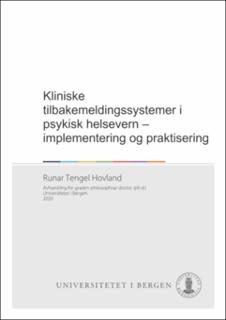| dc.contributor.author | Hovland, Runar Tengel | |
| dc.date.accessioned | 2020-04-30T13:38:03Z | |
| dc.date.available | 2020-04-30T13:38:03Z | |
| dc.date.issued | 2020-05-11 | |
| dc.date.submitted | 2020-04-23T11:51:13.084Z | |
| dc.identifier | container/91/ee/b8/b1/91eeb8b1-5de2-4e95-ba43-07ccd67eac57 | |
| dc.identifier.isbn | 9788230857557 | |
| dc.identifier.isbn | 9788230869628 | |
| dc.identifier.uri | https://hdl.handle.net/1956/22061 | |
| dc.description.abstract | Clinical feedback systems or progress monitoring systems (CFS) have gained increasing interest over the past twenty years. They were developed to enable clinicians to monitor treatment and to enhance patient outcome. Several randomized controlled studies and meta-synthesis have found positive effect on treatment outcome when clinicians have used CFS as part of treatment. Despite overall positive results, implementing CFS into routine practice is challenging. Challenges cover a broad range of issues, from technical to philosophical barriers. Thus, the field has gained more interest into the implementation research of CFS’s barriers and facilitators. My project is within this last category, studying the Norse Feedback (NF) implementation. Norse Feedback is a Norwegian feedback system, developed on the basis of patients’ and clinicians’ user involvement. NF was implemented in 2015 through a step-by-step process within the Førde Hospital Trust’s psychiatric departments. My research project aimed at exploring the variations in stakeholders’ experiences with the implementation process, and the routine use of NF in therapy. The project was designed as a case study, which included archival data, field reports, and in-depth interviews collected over a ten-month period and with start-up at the autumn of 2016. The sociology of standards and of new materialism constitutes the project’s main theoretical foundation. The basic research question was: How do stakeholders experience the implementation process, and the practicing of the NF as part of treatment? Based on an overall inductive analysis of the data material three, research questions were developed and were answered in three subsequent articles. The first article explored contextual aspects of the implementation of NF, and we found a range of issues that followed the implementation. We then asked the clinicians what else that demanded their attention, how they prioritized between these demands, and how this context affected the NF. Within an environment characterized by time- and work pressure, we found that counted things count. This situation affected the NF implementation negatively. The second article focused on how the NF functioned within a clinical encounter. We found that the NF had potential as a communication means, spurring a more focused patient therapist dialogue. The third article showed that the NF’s potential outreach within the Norwegian mental health system is limited, as it alienated or lacked features to enable illiterates, foreign language speakers, and elderly or others that felt uneasy using digital tools. Clinicians also assessed that some patients were too ill to benefit from it. Thus, when clinical feedback systems enter complex mental health settings, the implementation process also becomes complex. It is difficult to account for all issues that may arise. The implementation interacts with its context in a manner that hardly is reducible to single isolated determinants. | en_US |
| dc.language.iso | nob | eng |
| dc.publisher | The University of Bergen | eng |
| dc.relation.haspart | Artikkel 1: Hovland, R. T., & Moltu, C. (2019). Making way for clinical feedback system in the narrow space between sessions. Navigating competing demands in complex health care settings. Journal of Mental Health Systems, 13:68. The article is available in the main thesis. The article is also available at: <a href="https://doi.org/10.1186/s13033-019-0324-5" target="blank">https://doi.org/10.1186/s13033-019-0324-5</a> | eng |
| dc.relation.haspart | Artikkel 2: Hovland, R. T., Ytrehus, S., Mellor-Clark, J., & Moltu, C. How patients and clinicians experience the utility of a personalized clinical feedback system in routine practice. The article is not available in BORA. | eng |
| dc.relation.haspart | Artikkel 3: Hovland, R. T., & Moltu, C. (2020). The challenges of making clinical feedback in psychotherapy benefit all users: A qualitative study. Nordic Psychology, 72(3):248-262. The article is not available in BORA due to publisher restrictions. The published version is available at: <a href="https://doi.org/10.1080/19012276.2019.1684348" target="blank">https://doi.org/10.1080/19012276.2019.1684348</a> | eng |
| dc.rights | In copyright | eng |
| dc.rights.uri | http://rightsstatements.org/page/InC/1.0/ | eng |
| dc.title | Kliniske tilbakemeldingssystemer i psykisk helsevern – implementering og praktisering | eng |
| dc.type | Doctoral thesis | |
| dc.date.updated | 2020-04-23T11:51:13.084Z | |
| dc.rights.holder | Copyright the Author. All rights reserved | eng |
| fs.unitcode | 17-34-0 | |
